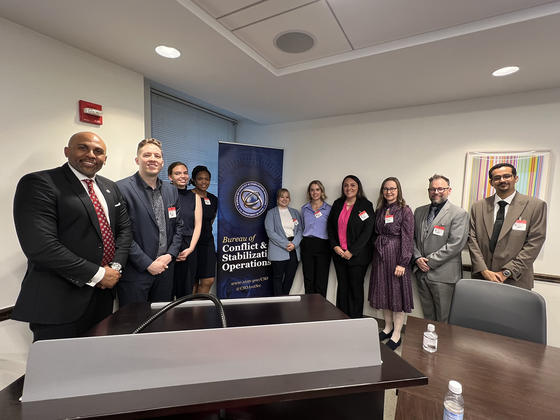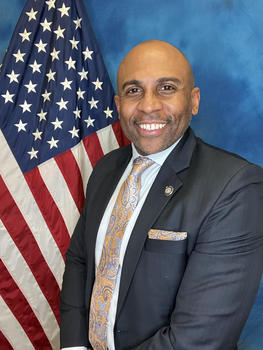Presentations aren't an uncommon final exam component. But few are as high stakes as presenting research to the U.S. Department of State in the hopes of paving the pathway to peace in fragile countries.

As part of the new Academic Centers of Conflict Anticipation and Prevention (ACCAP) initiative, George Mason University students in the new Jimmy and Rosalynn Carter School for Peace and Conflict Resolution course Fragile States Policy had the opportunity to work with the U.S. Department of State on priority research.
ACCAP is a national academic partnership between American higher education institutions and the U.S. Department of State’s Bureau of Conflict and Stabilization Operations (CSO) to anticipate, respond to, and prevent conflict in the global system that impacts U.S. national security interests.
“No matter how great the expertise of our staff or contractors, there’s only so much capacity we have to address some very critical topics,” explained Keith E. Noble, CSO’s Chief Data Officer and Advanced Analytics Office Director, who served as the instructor for the course in Carter School. “The idea for ACCAP is that we can reach out to our university partners to get supplemental analysis, research, and data that can help us expand our priorities.”
The U.S. Department of State initiated a search for the inaugural cohort of institutions conducting research in the conflict and stabilization space. The Carter School was, according to Noble, one of their first picks.
This first cohort includes eight institutions, with hopes for expansion.
Based on conversations with its office directors and other agencies, CSO compiled a list of research opportunities pertaining to countries represented in the Global Fragility Act (GFA). Each institution can then claim the opportunities through a database, based on whether they have faculty with expertise, or interest in teaching a course or capstone around a relevant topic. The Carter School took it one step further: what if Noble himself taught a course based on this consortium, and selected the topics for Carter School students to research?
Noble, who saw this as an opportunity to demonstrate how CSO wanted each institution to approach their selected research, agreed.
For the course, Noble selected topics that he thought would be achievable within the semester time frame as well as appropriately challenging for the students—Coastal West Africa: Social Network Analysis (Ghana and Togo); Women, Peace, and Security (Haiti); Women in Politics (Haiti); and Communal Impact Mining (Papua New Guinea).
Chad Cline, MS in Conflict Analysis and Resolution ‘24, was on the Women, Peace, and Security team. “I learned so much about each country in the GFA,” he said of his classroom experience. “It gave me a different perspective.”
With ACCAP’s goal being delivering valuable research to CSO, Noble wanted stakeholders involved in his students’ research from the start. “We wanted this to be an iterative process where department staff spent time investing in the students, providing mentorship and building relationships so the department could, first, get a better final product, and second, show these students that CSO could be a destination after they graduate,” Noble said. “It was mutually reinforcing incentives.”
At the end of the course, Carter School students presented their work at the U.S. Department of State; George Mason was the first institution to submit completed projects.

“It was a mix of anticipation, preparation, and planning, as well as a deep sense of responsibility,” recalled Hamad Aldhlea, a PhD student in conflict analysis and resolution. His team worked on Coastal West Africa: Social Network Analysis. “I received invaluable feedback, and it was an excellent opportunity to build a network with State Department officials.”
The course is planned to run again in the fall.
“There are any number of internships and opportunities for students within this department and other USG agencies that offer great experience, but rarely reach the critical point where the work the students are doing is impacting policy,” Noble said. “This work, however, is filling critical gaps and will have real and practical impacts on our offices and the work we do. We’re looking to the Carter School to make substantive contributions to our global mission.”
Karina Valenzuela, a PhD student in conflict analysis and resolution, also worked on Women, Peace, and Security. “It’s one thing to write a paper for a grade and quite another to present research to a group of professionals working in these complex situations who tell you the work you’ve done is valuable,” she said.
Noble believes that the Carter School’s proximity to Washington, D.C. and the expertise and quality of its faculty and students will allow it to play a leading role in the developing ACCAP community.
“I think this will not only enhance the prestige of the university, but will help deliver real-time, value-added analyses that will help this government make better data-informed decisions,” Noble said, “and that’s something the Carter School should be very proud of.”
Related News
- October 17, 2025
- September 17, 2025
- May 30, 2025
- April 21, 2025
- March 17, 2025
